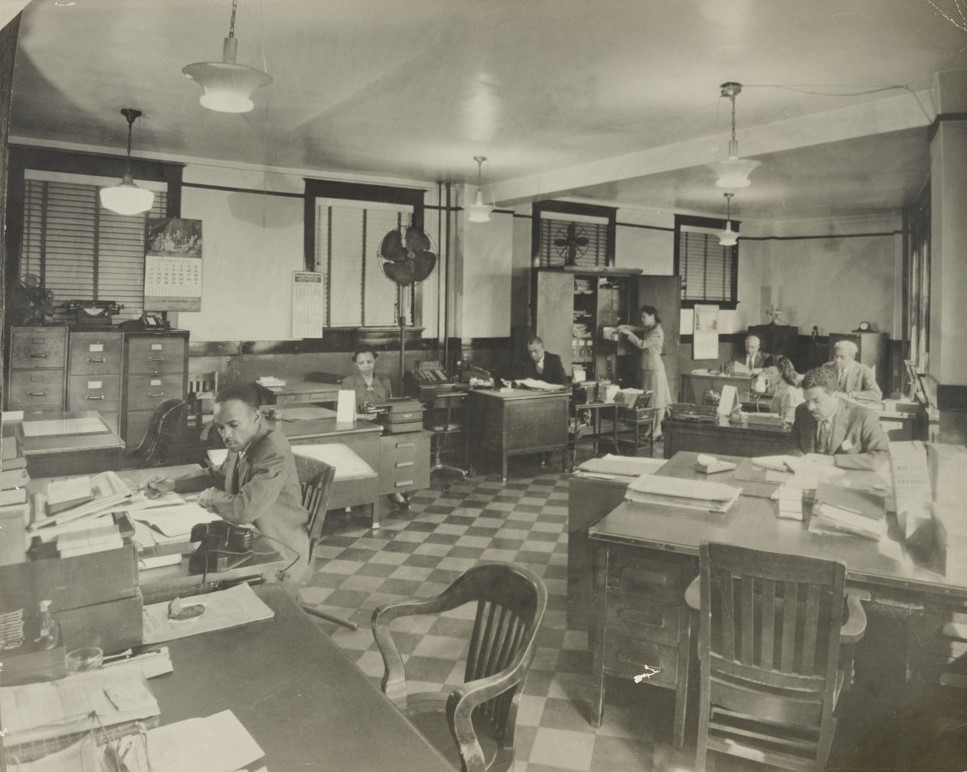Thanks to our partner, Durham County Library, a batch containing additional Durham Urban Renewal maps, Festival for the Eno posters, photographs, and taxes and poll tax books are now available on DigitalNC. Among the materials in this batch are photographs related to the North Carolina Mutual Life Insurance Company.
For centuries, life insurance has been utilized to provide financial assistance to beneficiaries of deceased individuals to help pay end-of-life costs and maintain financial security after an individual has passed. With changes and events in the United States such as the Panic of 1837 and passing of laws allowing women the right to purchase insurance policies in the 19th century, the life insurance industry saw a huge boom which carried into the 20th century. Despite the need to grow their policy holder numbers, life insurance companies in the decades following the formal end of enslavement, there was little, if any, interest to market to the Black community. And the few companies that did offer policies to Black individuals were unaffordable.
In 1898, seven Black community leaders in Durham founded the North Carolina Mutual and Provident Association to provide affordable life insurance to Black individuals. The company did more than just provide life insurance policies however. Rooted in the tradition of fraternal aid societies at the time and a sense of corporate social consciousness and responsibility, N.C. Mutual functioned as an instrument of social welfare and served as a center for Black politics, education, and philanthropy. Their “Double-Duty Dollar” concept took money from insurance sales and put them back into the Black community. This concept resulted in the building and uplifting of Black communities through jobs, investments, loans, community leadership, as well as support of community projects and charities. Today, the North Carolina Mutual Insurance Agency remains the oldest and largest active Black-owned life insurance company in the nation.
The photograph of the N. C. Mutual Glee Club from 1929 includes prominent Durhamite, Bessie Alberta Johnson Whitted (also referred to as “Miss Bess” and Mrs. B. A. J. Whitted, seated first on the left). She was one of the company’s first female employees, holding the position of cashier alongside bookkeeper and eventually assistant treasurer. Miss Bess was famous for helping build Black Wall Street in Durham, paving the way for women in business, musical direction, and her involvement in the community. She served as the advisor to the Junior Activities Committee of the Algonquin Club, president of the local chapter of Iota Phi Lambda Sorority for business women, and director of both the N. C. Mutual Glee Club and St. Joseph AME Church choir.
To learn more about Durham County Library, visit their website. To view more materials related to Urban Renewal in Durham, view our Durham Urban Renewal Records exhibit linked here. To browse more materials from Durham County Library, visit their contributor page here.
Information about the North Carolina Mutual Life Insurance Company was gathered from the company’s website here, North Carolina History encyclopedia entry, “North Carolina Mutual Life,” linked here, and the NCpedia entry “North Carolina Mutual Life Insurance Company,” linked here. Information about Bessie Alberta Johnson Whitted was gathered from articles in The Carolina Times from May 16, 1942, April 18, 1959, and August 8, 1959.



